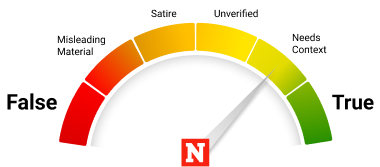Kevin McCarthy's ousting as speaker of the House on Tuesday led to questions over the possibility of Donald Trump being able to, in theory, take over the role. McCarthy's removal was instigated by pro-Trump Republican Congressman Matt Gaetz.
At least three GOP House members—Rep. Troy Nehls of Texas, Greg Steube of Florida, and Marjorie Taylor Greene of Georgia—have already indicated that they will support the former president in voting to select a new House speaker.
However, one commentator suggested that Trump's indictments would automatically stop him from hammering the House gavel.

The Claim
A post on X, formerly Twitter, by New York's former assistant attorney general Tristan Snell, posted on October 4, 2023, viewed 300,600 times stated "BIG DEAL - Trump CAN'T be Speaker—because of his indictments. House Republicans' own rules require a leader to step aside if indicted for a felony of 2+ years of prison."
The post included screengrabbed text which stated: "Rule 26—Temporary Step Aside of a Member of Leadership who is Indicted (a) A member of the Republican Leadership shall step aside if indicted for a felony for which a sentence of two or more years imprisonment may be imposed."
The Facts
The text quoted by Snell is from the House Republican Conference for the 118th Congress, internal congressional rules agreed upon by the GOP.
According to the Congressional Research Service, the rule quoted by Snell has been adopted since January 3, 2005. The advisory sentencing guidelines for the charges, for instance, relating to Trump's alleged mishandling of multiple classified documents after he left the White House, are roughly between 15-and-a-half and 19-and-a-half years. The rule would then, therefore, seemingly restrict the former president from congressional leadership.
However, these rules are not statute and can be changed by the GOP. It would require the creation of an ad hoc committee, appointed by the speaker and chaired by a senior Republican member of the Committee on Rules of the House.
Does this mean that Trump could qualify, as long as congressional Republicans changed their own guidelines?
Politics professor Todd Landman, of the University of Nottingham, told Newsweek that while it's possible to change the rules, this would not be without risk for the GOP.
"Changing the indictment rule risks charges of hypocrisy towards the Republican Party," Landman said.
David Andersen, an associate professor of U.S. politics at Durham University, told Newsweek that there were "enough never-Trumpers and long-term members who respect the institution of the House within the GOP" to create division and opposition in the event that such a change was proposed.
"Even for those who support Trump, this would be akin to turning over the House majority to someone who would only use the office to run a presidential campaign," Andersen said. "What this would lead to is a deep internal divide about whether to remove the rule or not, but Trump would likely win this battle."
Even after such a corralling, Trump would need to be voted in and the likelihood of that would be a significant challenge, as Iwan Morgan, professor emeritus of U.S. studies at University College London told Newsweek.
"Getting Trump elected speaker would be a tougher task—every Democrat would vote no, and it only requires five non-MAGA GOPs to follow suit," Morgan said.
"And some conservative Republicans would think twice, too, about the likely damage to the reputation of Congress if this were done. Note that House Rules Chairman Tom Cole (R-OK), who voted for McCarthy to retain his office, warned that his ouster was 'simply a vote for chaos.'"
So while on a number of technicalities, the Republican party could change its rules to accommodate Trump, it may cause even further division within the party at a time when it has already been left reeling by Kevin McCarthy's exit.
Furthermore, even if the rules were changed, Trump would still have to face a vote that could quite plausibly not land in his favor.
Trump has also previously stated that he is not interested in the position.
"No, it's not something I want to do. I want to look at what's happening, and then we're going to be doing something else. No, it's not something I would be interested in," Trump said in an interview in March 2022.
The Ruling

Needs Context.
The rule restricting Republican leadership appointments has been adopted by the House Republican Conference since 2005. It is, however, not statute and can be altered by the GOP.
This means it could be changed to allow Trump to become House speaker. Yet doing so may risk further dividing the GOP, even before Trump could be voted in.
While, technically, he could still become House speaker while indicted, the effort required to engineer it makes the chances of it happening very thin.
FACT CHECK BY Newsweek's Fact Check team
Uncommon Knowledge
Newsweek is committed to challenging conventional wisdom and finding connections in the search for common ground.
Newsweek is committed to challenging conventional wisdom and finding connections in the search for common ground.





